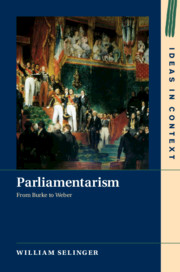Book contents
- Parliamentarism
- Ideas in Context
- Parliamentarism
- Copyright page
- Contents
- Acknowledgments
- Introduction
- Chapter 1 The Eighteenth-Century House of Commons
- Chapter 2 Edmund Burke’s Theory of Parliamentary Politics
- Chapter 3 The French Revolution and the Liberal Parliamentary Turn
- Chapter 4 Reinventing Parliamentarism: The Significance of Benjamin Constant
- Chapter 5 Democracy in America, Parliamentarism in France: Tocqueville’s Unconventional Parliamentary Liberalism
- Chapter 6 John Stuart Mill and the Victorian Theory of Parliament
- Conclusion
- Bibliography
- Index
- Ideas in Context
Conclusion
Published online by Cambridge University Press: 05 July 2019
- Parliamentarism
- Ideas in Context
- Parliamentarism
- Copyright page
- Contents
- Acknowledgments
- Introduction
- Chapter 1 The Eighteenth-Century House of Commons
- Chapter 2 Edmund Burke’s Theory of Parliamentary Politics
- Chapter 3 The French Revolution and the Liberal Parliamentary Turn
- Chapter 4 Reinventing Parliamentarism: The Significance of Benjamin Constant
- Chapter 5 Democracy in America, Parliamentarism in France: Tocqueville’s Unconventional Parliamentary Liberalism
- Chapter 6 John Stuart Mill and the Victorian Theory of Parliament
- Conclusion
- Bibliography
- Index
- Ideas in Context
Summary
I begin the Conclusion by considering the widely felt crisis of parliamentarism that unfolded at the turn of the twentieth century as the rise of electoral democracy led to the rise of a plebiscitary executive, upending previous presumptions about the centrality of parliament to political life. But despite these transformations, the classical liberal theory of parliamentarism persisted, most notably in the writings of Max Weber, who defended a constitutional ideal that was strikingly similar to that of Benjamin Constant. In the decades since Weber, political institutions have evolved even further away from the liberal parliamentary model. Yet the values and concepts of liberal parliamentarism continued to persist in twentieth-century democratic theory. Recent political crises reveal that the liberal constitutional structures put in place during the second half of the twentieth century have by no means overcome the enduring problems of modern representative government, which an earlier tradition of liberal theorists sought to answer through parliamentarism.
Keywords
- Type
- Chapter
- Information
- ParliamentarismFrom Burke to Weber, pp. 194 - 206Publisher: Cambridge University PressPrint publication year: 2019

